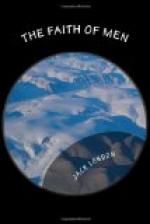But no flying dogs came up the trail, nor down the trail, to Twenty Mile. And John Thompson told Jees Uck, with a certain gladness ill concealed, that Bonner would never come back again. Also, and brutally, he suggested his own eligibility. Jees Uck laughed in his face and went back to her grand log-house. But when midwinter came, when hope dies down and life is at its lowest ebb, Jees Uck found she had no credit at the store. This was Thompson’s doing, and he rubbed his hands, and walked up and down, and came to his door and looked up at Jees Uck’s house and waited. And he continued to wait. She sold her dog-team to a party of miners and paid cash for her food. And when Thompson refused to honour even her coin, Toyaat Indians made her purchases, and sledded them up to her house in the dark.
In February the first post came in over the ice, and John Thompson read in the society column of a five-months-old paper of the marriage of Neil Bonner and Kitty Sharon. Jees Uck held the door ajar and him outside while he imparted the information; and, when he had done, laughed pridefully and did not believe. In March, and all alone, she gave birth to a man-child, a brave bit of new life at which she marvelled. And at that hour, a year later, Neil Bonner sat by another bed, marvelling at another bit of new life that had fared into the world.
The snow went off the ground and the ice broke out of the Yukon. The sun journeyed north, and journeyed south again; and, the money from the being spent, Jees Uck went back to her own people. Oche Ish, a shrewd hunter, proposed to kill the meat for her and her babe, and catch the salmon, if she would marry him. And Imego and Hah Yo and Wy Nooch, husky young hunters all, made similar proposals. But she elected to live alone and seek her own meat and fish. She sewed moccasins and parkas and mittens—warm, serviceable things, and pleasing to the eye, withal, what of the ornamental hair-tufts and bead-work. These she sold to the miners, who were drifting faster into the land each year. And not only did she win food that was good and plentiful, but she laid money by, and one day took passage on the Yukon Belle down the river.
At St. Michael’s she washed dishes in the kitchen of the post. The servants of the Company wondered at the remarkable woman with the remarkable child, though they asked no questions and she vouchsafed nothing. But just before Bering Sea closed in for the year, she bought a passage south on a strayed sealing schooner. That winter she cooked for Captain Markheim’s household at Unalaska, and in the spring continued south to Sitka on a whisky sloop. Later on appeared at Metlakahtla, which is near to St. Mary’s on the end of the Pan-Handle, where she worked in the cannery through the salmon season. When autumn came and the Siwash fishermen prepared to return to Puget Sound, she embarked with a couple of families in a big cedar canoe; and with them she threaded the hazardous chaos of the Alaskan and Canadian coasts, till the Straits of Juan de Fuca were passed and she led her boy by the hand up the hard pave of Seattle.




